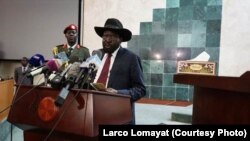South Sudan’s foreign minister says the government will on Wednesday begin consultations with civil society, political parties and other stakeholders to determine how best to move the peace process forward.
This after President Salva Kiir refused to sign a peace deal document with rebel leader and former vice president Riek Machar on Monday at peace talks in Ethiopia. Kiir said he needs 15 days for consultations before signing a peace deal that is expected to end South Sudan’s conflict.
South Sudan Foreign minister Barnaba Marial Benjamin says the proposed peace document, which Kiir refused to sign, is unlikely to solve the country’s 20-month conflict.
He says Kiir refused to sign the deal because mediators did not update the document with changes recommended by officials at a recent heads of state summit in Entebbe, Uganda.
Benjamin says the peace deal which mediators wanted President Kiir to sign, would have infringed on the country’s sovereignty. He says the document needs a thorough clean up.
He says the administration will only decide to sign the document if citizens give the “greenlight.” Benjamin says the president’s refusal to sign the proposed document has been welcomed by citizens who he says warmly greeted him on his arrival.
As soon as he arrived at the airport, Kiir briefed his executives and other stakeholders about his refusal to sign the document presented by mediators in Ethiopia, according to Benjamin.
“They applauded the president for having taken a wise, democratic decision not to have signed this document that would have compromised our independence, our dignity and our freedom,” said Benjamin.
He insists the government wants peace. But, representatives of rebel leader Machar expressed disappointment about the refusal of President Kiir to sign the document, which was aimed to end the conflict.
Critics have condemned Kiir’s refusal to sign the peace accord. They said his refusal is an indication of disinterest in ensuring peace returns to South Sudan, despite the death and suffering that the conflict has caused. They called for targeted sanctions against senior members of the administration, including Kiir.
Benjamin disagreed. He says the country’s international partners should rather help South Sudan to achieve peace and reconciliation.
“I think they should not be dangling this carrot and stick of sanctions because that does not solve the problem…So what is important is to help the Republic of South Sudan, be patient because peace is a process said,” Benjamin.





